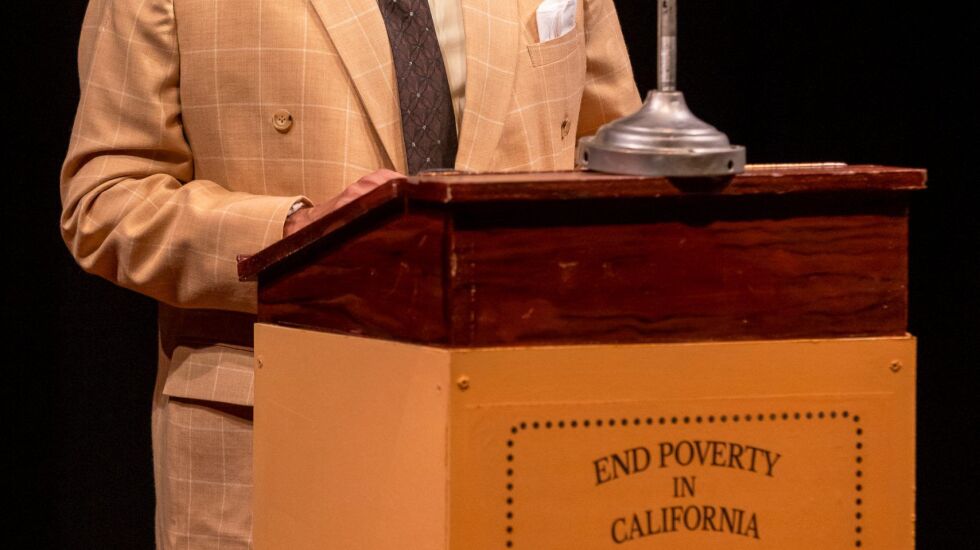
The more things change in American politics, the more they stay the same. That’s one possible takeaway from “Campaigns, Inc.,” a new political comedy at TimeLine Theatre Company that marks the playwriting debut of company member Will Allan.
Allan’s inspiration is the 1934 race for governor of California, and more specifically the work of a duo he identifies as among the first of a new professional breed: the political consultant.
Campaigns, Inc. was the name adopted by the two-person firm of Leone Baxter (Tyler Meredith) and Clem Whitaker (Yuriy Sardarov, late of NBC’s “Chicago Fire”). As the play opens, they’ve defected from the campaign of the Democratic candidate for lieutenant governor to pitch their services to the Republican incumbent governor, a vulgar blowhard named Frank Merriam (Terry Hamilton), who only ascended to his job upon his predecessor’s death a few months earlier.
Merriam’s opponent in the general is Upton Sinclair — yes, that Upton Sinclair. The muckraking author of “The Jungle,” the influential novel about the Chicago stockyards that’s made generations of high-school students consider vegetarianism, Sinclair (played here by Anish Jethmalani) was an activist but not a natural politician. He had twice run for office as a Socialist, unsuccessfully. But in 1934, with California still in the throes of the Depression, his “E.P.I.C. agenda” (“End Poverty in California”) led him to a surprise landslide victory in the Democratic primary.
At the time, California was a staunchly Republican state — a fact that feels so foreign to our current reality that just stating it can get some chuckles from a friendly audience. But Sinclair had both fame and a solid ground game on his side; his campaign had registered more than 300,000 new Democrat voters, and he received more total votes in his primary than Merriam did in his.
Spooked, and willing to do almost anything to avoid the humiliation of handing the state to a Democrat, Merriam is receptive to Baxter and Whitaker’s overtures. Unable to come up with any real dirt on the principled Sinclair (in a scene that suggests the birth of “opposition research”), the consultants decide to invent some.
The pair extract nasty passages from Sinclair’s books — often quoting the stories’ grotesquely anti-worker captains of industry — and printed them on millions of billboards and direct-mail flyers as if they were quotes from Sinclair himself. They enlisted the political editor of the then-conservative Los Angeles Times to print false attacks on Sinclair while also writing speeches for Merriam. Eventually, anti-union movie mogul Louis B. Mayer signed on to create phony, scripted anti-Sinclair newsreels to run before MGM movies.

That this sophisticated of a smear campaign really was deployed many decades before cable news and social media is fascinating history. But the tactics weren’t new, even if their scale was. What was new, Allan’s script suggests a little too subtly, is Baxter and Whitaker’s amoral, party-agnostic attitude toward their work.
Particularly in the scenes between Baxter and Whitaker, “Campaigns, Inc.” takes on the flavor of the kind of screwball comedy that was popular at the movies in the 1930s. You can understand Allan’s impulse. The real-life Whitaker eventually divorced his first wife to marry the widowed Baxter, and appealing actors Meredith and Sardarov have the kind of timing and chemistry that you could see slotting right into a period piece, say, the Clark Gable and Claudette Colbert roles in 1934’s “It Happened One Night.”
And yet, in Allan’s script and in director Nick Bowling’s staging, Whitaker and Baxter’s story often seems to take a backseat to competing interests. As if bound by the old FCC fairness doctrine, “Campaigns, Inc.” is determined to allot equal time to Hamilton’s cartoon-villain Merriam and Jethmalani’s too-good-for-this-world Sinclair.
And for some reason, Allan gives far too much focus to Charlie Chaplin. Sinclair was friendly with the silent film legend, played here by Dave Honigman, but Allan makes Chaplin and his own anxieties about a changing Hollywood too prominent. Despite Honigman’s engaging performance, Chaplin feels like a distraction.
The number of Depression-era boldface names who played a part in this election is interesting, sure. (Allan even includes a cameo by early film royalty Douglas Fairbanks and Mary Pickford that I suspect will fly over the heads of most audience members.) But Baxter and Whitaker should be the stars here. I’ve checked the latest polls, and what “Campaigns, Inc.” could use is a tighter focus on its central characters’ mercenary motivations.







